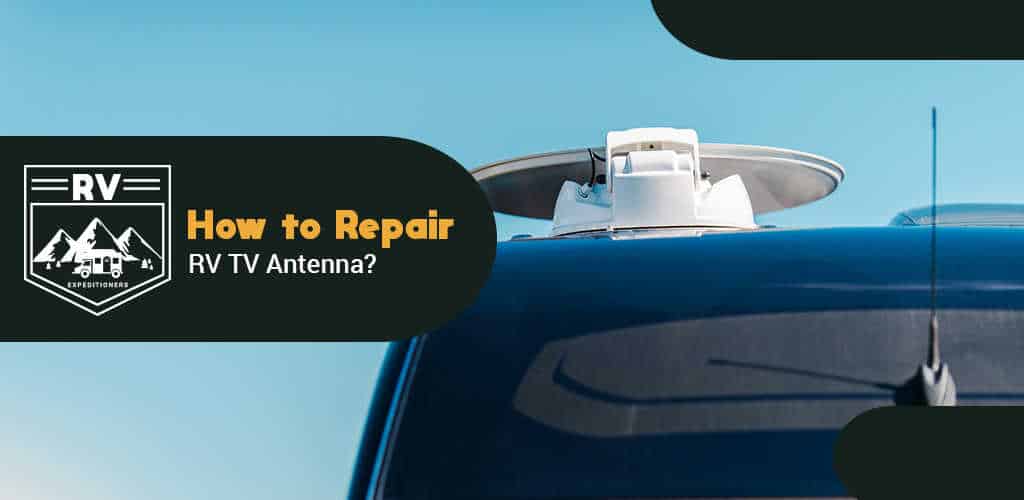Repairing the RV TV antenna isn’t going to be a walk in the park.
That’s because of two things. First of all, the antenna itself may not be the reason why you’re not getting a TV signal. Since it’s part of an array of components responsible for capturing, boosting, and tuning to TV signals, anything in the signal path could be at fault.
Secondly, only some repairs can be done without an electrician’s background. When it comes down to taking apart components and replacing minor parts, you need knowledge, tools, and a pair of very steady hands.
Since there’s no need to make things worse, here are some of the things that you can do to service your TV antenna if life in the motorhome just got a whole lot duller.
Necessary Tools
You don’t need much to either inspect or service your RV TV antenna. But, there are a few tools that are indispensable in these types of situation:
- Voltmeter or digital multimeter
- Non-conductive gloves
- Spare coaxial cable
- Coaxial cable connectors
Step-by-Step Guide to Identifying Antenna Issues and Fixing Them
Check the wall plate
Always start by switching the wall plate on, or the booster, before deciding that the antenna is not working properly. Do this and check your TV signal again.
Check coaxial cables
If you have an exterior antenna, climb on to the roof of your RV and inspect the coaxial cable. Separate the antenna head from the coaxial cable and look for signs of corrosion. Also make sure that the coaxial cable lead is intact and at the proper length – it should be exposed about this much[1] or it might not connect properly.
Use a multimeter to check the cable voltage
A digital multimeter can be your go-to tool for figuring out what’s wrong with your electrical equipment. You definitely need one for your motorhome. A coaxial cable should give you a reading of 12V DC as long as it’s working properly.
Set the multimeter to voltage/potential mode to check the cable voltage. Put the red lead (positive) on the cable’s center conductor and the black lead (negative) on the exterior.
If you get a 12V reading then your cable is working fine. If not, the culprit is the cable itself or one of the upstream components.
Cable voltage good but still no signal
This is where things get interesting. If your meter reads 12V when using it on the cable but your TV still has no signal or very weak signal, then the problem could lie with your wall plate booster or the antenna amplifier.
Use the multimeter on the wall plate
Disconnect the coaxial cable that goes from the antenna head to the wall plate. Use the meter on the board of the wall plate. If it’s not showing 12V, you may need to replace the wall plate.
Dealing with a failing antenna amplifier
If you’ve already done everything listed above and it all looks fine but you’re still not getting a good signal, then the problem is likely the antenna amplifier.
The amplifier is found in the antenna head. You will have to replace the entire thing.
Check and see if the antenna head is shorted
You can disconnect the antenna head and switch the wall plate on. If the light is on then the antenna head might be shorted and it will need replacing. Again, this is a task better left for a specialist
Tips and Warnings
- There aren’t many things that you can do to fix your RV TV antenna other than replacing a faulty cable or replacing the antenna entirely
- Don’t attempt any complicated repairs if you don’t have a good grasp of electrical systems
- Wear protective gloves when working with electrical wires inside or outside your RV
- To avoid having to worry about weak signals or potential repairs, it’s often best to just invest in a more expensive or higher-end antenna
- When deciding between outdoor and indoor RV antennas, remember that outdoor antennas have way better reception
- Protect the antenna by lowering it while you’re driving your RV, especially if you’re driving on rough terrain or in wooded areas
Conclusion
Now you know a thing or two about how to repair RV TV antenna issues. However, what if everything checks out and you’re still not getting a signal or a very weak one? You can never dismiss the possibility that the area you’re camping in simply has too many obstructions and perhaps limited or no coverage.
Sometimes there’s simply not enough signal for the booster and amplifiers to work with. In those cases, you just have to wait it out until you get to a new location. And this is why having a multimeter is important.
It can give you peace of mind and prevent you from making rash decisions about your RV antenna.


I love the tip you gave that if you don’t have a good understanding of electrical systems then you should not touch or try to repair your antenna. These people should play it safe and hire a professional to come out and repair the antenna. Thanks for this advice that will save people from getting badly injured from failed antenna repairs.